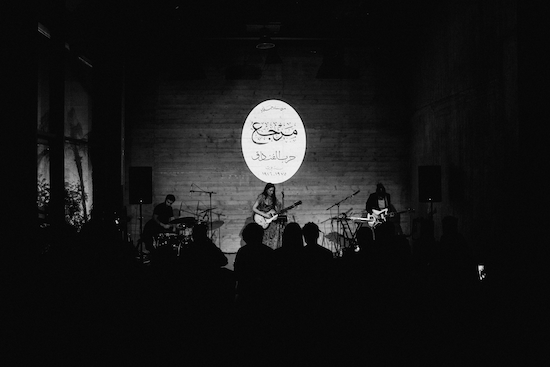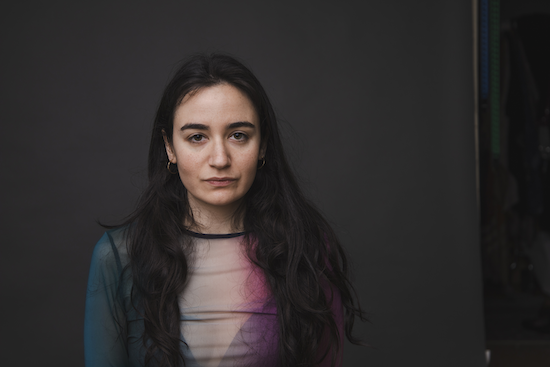Photo by Ely Dagher
Mayssa Jallad wanders around the vast TivoliVredenburg venue complex in Utrecht, taking in the increasingly busy venue where the Lebanese artist and her band are slated to play for Le Guess Who? festival. In my darker moments I have referred to it as a Ballardian hellscape, or a stack of very groovy airport lounges, but Jallad has another interpretation. Enthusiastic and engaging, she praises the venue despite its “kinda crazy” vibe, talking about how good architecture can act as a weathervane for wider society. Jallad: “Architecture is the ultimate human reflection. You can learn so much about humans and how they behave by studying their architecture. Especially in cities.”
She should know. An architect by profession, Mayssa Jallad has made a remarkable record about another set of buildings, originally, like TivoliVredenburg built to serve the demands of leisure but, tragically, turned into instruments of war.
This record, Marjaa: The Battle Of The Hotels is a dream guide that uses buildings as its protagonists. A good portion soundtracks the history of the world’s first high-rise urban battle; a five month-long shoot-out amidst Beirut’s luxury hotel district of Minet El Hosn during the Lebanese Civil War. Jallad employs a “storytelling approach” across seven songs each named after the hotels. These buildings became the focal points for intolerance, rage, and death; their size and height meant they were repurposed as command posts and deadly sniper points. When the fighting ended, The Green Line was set up, a demarcation dividing Beirut into east and west that lasted until 1990, and polarising a society that is still coming to terms with the echoes of the past.
A difficult brief for a music project, to say the least. Luckily, Marjaa: The Battle Of The Hotels is a record that sidesteps the pitfalls that other works concerned with atmosphere or memory fall into. Many of them can be clunky and contrived; listening in can be a slog, and it can be hard to process them without becoming as pretentious as the sounds you take on board. Jallad’s record, however, acts as a slow burning process of revelation. Its hit-and-miss elements – the feeling that sometimes the music is conducted on the hoof – only add to its veracity. Jallad: “There was no plan, the record was completely experimental, and based on research I’d done as an architect and my master’s thesis. I realised I was going mad just working in an office; I was wilting, I love architecture and I can’t live without it but, I really needed music in my life!”
Jallad talks with a rare eloquence about Lebanon, using her knowledge of the history of Lebanese architecture to present a morality tale of sorts. Her passion and love for it makes her story flow like clear spring water. According to Jallad, when Lebanon became independent of the French Mandate in 1943, a movement of regional modernism in architecture sprung up. This movement was concerned with questions around modernism’s ability to respond to the local climate and the traditions of the land. Allied to this, the skyscrapers were the modern phenomena in the Lebanon of the 1960s and 70s; manifestations of the money that flowed into the country from the late 1950s onwards, because of regime changes in the Arab world, the Gulf development of oil, and the influence of Palestinian businessmen who had settled in Lebanon after the Nakba. “Over time these skyscrapers shot up, but they became a double-edged sword for us, as they were used for the war.”
The record may have started as Jallad and “lyrics and a guitar, and just some very simple melodies”, but it took five years to complete. There are two distinct parts: in the first, ‘Dahaliz’, Jallad walks through the city, trying in vain to follow the intricate small roads known as dahaliz on an old map; many have been destroyed by new developments since the 1960s. To help her map the journey sonically she turned to musician, composer, and musicologist Youmna Saba, whose research delves into the relationship between electroacoustic music and the Arabic language in its sung form. Jallad found a way forwards through Saba’s practice: “She turned me on to writing spaces in music, how do you write, or express silence in music?” They collaborated on the first two songs and Jallad began to cement her approach as the album progressed. “It’s the first time I have made research-based music. What I did previously was more folky.”
The record seems to have developed incrementally, as did the employment of an exclusively Lebanese set of musicians helping flesh out the basic, storified tracks. Jallad saw collaboration as vital, especially as she tried to plot “everyone’s history” of the city. The record became something else again after four songs were completed, with Saba and producer and co-writer Fadi Tabbal. Firstly the subject matter became distinctly more sombre. Says Jallad, “Fadi Tabbal said, ‘You know what to do now, right? Now you write the battle.’” Given the subject matter, it “took a while to convince people this was the right time to focus on a project like this”. Nevertheless, guitarist Julia Sabra and drummer Pascal Semerdijan joined the fold. Sometimes the music was made out of nothing; an ongoing “experiment”. For example, the last track of the battle, ‘Holiday Inn (March 21 to 29)’ only had lyrics, so Jallad brought in electronic musician Sary Moussa who triggered synths that were triggered from Semerdijan’s drumming.
For Jallad, the pressing question was, how does one write out a battle in music? “I decided I would embody the buildings, and my lyrics would give voice to the buildings where the battle was taking shape.”
You took on the soul of the buildings?
Mayssa Jallad: I say, ‘Red invades my body’ in the lyrics, literally. So I am imagining what it would be like for this inanimate structure to be lived in by the fighters, and to be used as a weapon.

Photo by Gabriel Ferneine
Weren’t you broken up by this approach, to use an architectural pun?
MJ: I realised that the city that I thought I knew was actually something else, and I was more traumatised than I thought I would be. The ‘Markaz Azraq’ song, which is about Blue Headquarters, is about this terrible massacre that took place there. [Blue is Jallad’s way of signifying Christian Nationalists, the Lebanese Front, while Red is the pro-Palestine faction.] I never knew it had happened, and I have often eaten at the little cafe there. That was shocking to me! So the research was emotional, and translating that research into music was of course going to be more emotional. That included trying to convey a lot of deep-seated trauma that my parents had probably witnessed but never talked about.”
And now that this work, with the associated trauma, is a record, an artefact, can you stand aside from it? And you will be selling this later at Le Guess Who? festival, saying, ‘Buy my record!’
MJ: Yes, but it’s an artefact of a history that needs to be told and no-one else is telling it. In the history books in Lebanon, the civil war is never talked about because those who perpetrated the war became the politicians of today. So this is very current and I feel the history of this area needs to be much better known. Certainly, in terms of introducing this story of urban warfare, it’s very relevant now, and for the youth of Lebanon, who have no clue about this history, I think it’s a cultural document that also calls for change. It’s an activist album.”
This may sound like a loaded, maybe ignorant question, but I promise you it’s not meant that way: why do you think such terrible events often seem to happen in that part of the world?
MJ: This area is the cradle of monotheistic religion, right? It’s an extremely contested space and religion is part of the wider culture rather than being just a set of religions. But coexistence is possible and we have seen it! It’s when you politicise religion against people. The greed for power through the tool of religion is always used against us. And we were divided based on power and alliances, not religion. But I really think it is possible to find peace. First, we need to have politicians who care for peace and here politicians don’t often care for peace, they care for power and money. And they always have. You know, When you live in Lebanon I think it’s impossible not to be affected by space. It’s a space that has daily struggles but also gives you so much.
What is it about hotels, do you think, that attracts violence?
MJ: I say this in a lyric! Hotels invade areas that weren’t really owned by anybody. There is a mysterious ownership, nobody lives there, they are settings for a transient, ephemeral movement of people. People leave them quickly, too. The hotels were a proof of a golden age for Lebanon, and they were the stage for a lot of important conversations. The spy stories of Lebanon are intriguing, a lot of spies met in one hotel during the Cold War, like the St George hotel. So when the militias invaded the hotels this collapsed.
All that gets left behind are the footprints of vanished people.
MJ: I thought about the footprints of the militias in these spaces and how we’ve inherited their footprints. You know, our city still really shapes us. And all the music coming out here now is affected by Beirut in one way or another. We’ve gone through so much recently, such as the revolution, which was an insane moment in the history of Lebanon. We had never seen a movement like this, act in such a broad, non-sectarian way. And a few months later the protests were quashed by Covid, then the currency started dropping, then the explosion [at the docks]. Now people are just struggling with electricity and basic needs. It’s a whole thing to get electricity at your house or at the studio, playing music. Then a couple of summers ago we had a gas crisis. But the wider community helps so much; we’ve all been through this together.”
If you could be in power in Lebanon, what would be the first thing you would do, architecturally? How would you reshape your land?
MJ: I would first explain the history of the land to people. And that there are specific reasons for the trauma they are still going through. Architecturally, I would redevelop the downtown of Beirut! Beirut was redeveloped as a kind of Disneyland. It’s just a marketing strategy, it’s not a downtown. Every time something bad happens the people go to protest there. But nobody lives there. So I would make rent super accessible, as it’s so expensive. I would bring people back to Beirut, make social housing, renovate old buildings… bring the city back to the people! Stop urban injustice; any city’s heritage is not the stone or concrete, it is people.”



